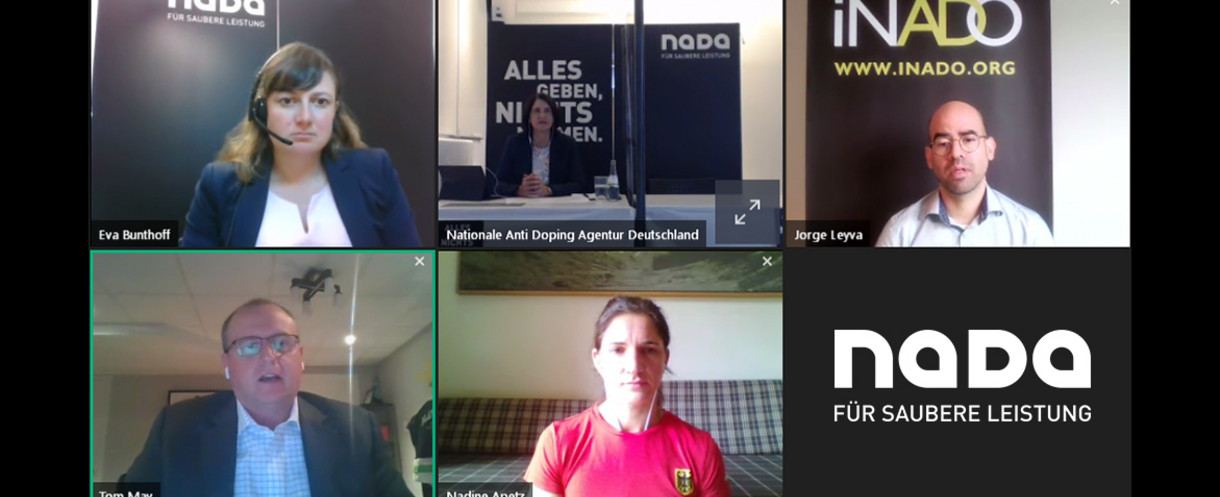
Zentrales Thema des diesjährigen, erstmals digital organisierten, Journalisten-Workshops waren die Folgen der COVID-19-Pandemie auf die Arbeit der Nationalen Anti Doping Agentur (NADA).
"Als Auswirkung der COVID-19-Pandemie musste die NADA die Durchführung klassischer Dopingkontrollen, in Form von Urin- und Blutkontrollen, für knapp zwei Monate aussetzen", sagte Dr. Andrea Gotzmann, Vorstandsvorsitzende der NADA: "Trotz der Reduktion der Kontrollen, lief die Anti-Doping-Arbeit weiter. Mittlerweile ist die NADA im Bereich der Dopingkontrollen außerhalb des Wettkampfes, den sogenannten Trainingskontrollen, zahlenmäßig wieder auf Vorjahresniveau."
"Die NADA befindet sich in einem ständigen Austausch mit den Kolleginnen und Kollegen aus aller Welt. Nur durch diesen Erfahrungsaustausch und die unterstützenden Fachdiskussionen kann es gelingen, die Anti-Doping-Arbeit für die Zukunft weiterzuentwickeln und aus den Erfahrungen der Pandemie zu lernen", so Gotzmann.
Gemeinsam mit internationalen Fachleuten diskutierte die NADA das Thema "Die COVID-19-Pandemie - Auswirkungen auf die internationale Anti-Doping-Arbeit". Als Expertinnen und Experten waren auf dem virtuellen Podium dabei: Nadine Apetz (international erfolgreiche Boxerin, Athletensprecherin Deutscher Boxsport-Verband), Jorge Leyva (Geschäftsführer, Institute of National Anti-Doping Organisations, INADO), Tom May (Director, Program Development and NADO/RADO Relations, World Anti-Doping Agency, WADA) und Dr. Andrea Gotzmann (Nationale Anti Doping Agentur Deutschland, NADA).
Die Diskussionsrunde bildete in diesem Jahr den Abschluss des Journalisten-Workshops. Vorab organisierte die NADA digitale Stationen mit aktuellen Themen zu den Auswirkungen der Pandemie innerhalb der einzelnen Fachbereiche der NADA.
Stefan Trinks, Leiter des Ressorts Doping-Kontroll-Systems der NADA, gab einen Einblick in die Arbeit während des Lockdowns, die Wiederaufnahme von Dopingkontrollen im Mai 2020 und die Auswirkungen der COVID-19-Pandemie auf das kommende olympische Jahr.
Am 21. August 2020 hat die WADA die englische Fassung des Nationalen Anti-Doping Codes 2021 (NADC21) offiziell anerkannt. Die NADA setzt damit die Vorgaben des revidierten Welt Anti-Doping Codes 2021 (WADC2021) vorschriftsmäßig um und wird somit seitens der WADA für "compliant" erklärt. Dr. Lars Mortsiefer, Vorstandsmitglied und Chefjustitiar der NADA, erläuterte die wichtigsten Änderungen des überarbeiteten Regelwerkes. Zudem berichtete er über den Stand aktueller sportrechtlicher Verfahren.
Dr. Anja Scheiff, Leiterin des Ressorts Medizin der NADA, erläuterte die Neuerungen der Verbotsliste 2020 mit Blick auf das "Trendmittel" Cannabidiol. Darüber hinaus ging sie auf die Revision des Welt Anti-Doping Codes aus pharmakologisch-medizinischer Sicht ein. Die Einführung der Begrifflichkeit "Suchtmittel" für ausgewählte Betäubungs-und Rauschmittel wurde erklärt.
Ab nächstem Jahr wird es erstmalig einen Standard für Präventionsarbeit geben, der die Ausführungen in diesem wichtigen Bereich weltweit harmonisiert. Thomas Berghoff, Leiter des Ressorts Prävention der NADA, skizzierte den neuen Standard sowie dessen Umsetzung bei der NADA ab 2021. Zudem ermöglichte er einen Rückblick auf die Umsetzung von Präventionsmaßnahmen während des Lockdowns und des damit verbundenen Ansatzes von Präsenz- und Online-Schulungen in COVID-19-Zeiten.
-- Englisch --
Journalists' Workshop 2020: "The COVID 19 pandemic - impact on international anti-doping work"
The central topic of this year's workshop for journalists, which was organised digitally for the first time, were the consequences of the COVID-19 pandemic on the work of the National Anti Doping Agency of Germany (NADA).
"As a result of the COVID-19 pandemic, NADA Germany had to suspend the performance of classical doping tests, in the form of urine and blood tests, for almost two months," said Dr. Andrea Gotzmann, Chairperson of NADA Germany: "Despite the reduction in testing, the anti-doping work continued. In the meantime, in terms of numbers of out-of-competition doping tests, NADA Germany has returned to the level of the previous year".
"NADA is in a constant exchange with colleagues from all over the world. We can only succeed in further developing anti-doping work for the future and learn from the experience of the pandemic through this exchange and supportive expert discussions," said Gotzmann.
Together with international experts, NADA Germany discussed the topic "The COVID-19 pandemic - impact on international anti-doping work". The following experts took part in the virtual podium: Nadine Apetz (internationally successful boxer, athlete spokesperson of the German Boxing Federation), Jorge Leyva (Chief Executive Officer, Institute of National Anti-Doping Organisations, INADO), Tom May (Director, Program Development and NADO/RADO Relations, World Anti-Doping Agency, WADA) and Dr. Andrea Gotzmann (National Anti Doping Agency of Germany, NADA).
This year's discussion round marked the end of the journalists' workshop. In advance, NADA Germany organised digital stations with current topics on the effects of the pandemic within the individual departments of NADA Germany.
Stefan Trinks, Director Department Testing Program of NADA Germany, gave an insight into the work during the lockdown, the resumption of doping controls in May 2020 and the effects of the COVID-19 pandemic on the coming Olympic year.
On 21 August 2020, WADA officially recognised the English version of the National Anti-Doping Code 2021 (NADC21). NADA thus correctly implements the requirements of the revised World Anti-Doping Code 2021 (WADC2021) and is thus declared "compliant" by WADA. Dr. Lars Mortsiefer, Member of the Executive Board and Chief Legal Officer of NADA Germany, explained the most important changes of the revised Code. He also reported on the status of current sports law proceedings.
Dr. Anja Scheiff, Director Department Medicine of NADA Germany, explained the innovations of the Prohibited List 2020 with regard to the "trend drug" cannabidiol. She also addressed the revision of the World Anti-Doping Code from a pharmacological-medical point of view. The introduction of the term "Substance of Abuse" for selected narcotic drugs was explained.
As of next year, there will be a standard for education for the first time, which will harmonise the work in this important area worldwide. Thomas Berghoff, Director Department Prevention of NADA Germany, outlined the new standard as well as its implementation at NADA Germany from 2021 onwards. In addition, he provided a retrospective view of the implementation of prevention measures during the lockdown and the associated approach of face-to-face and online training in COVID-19 times.
